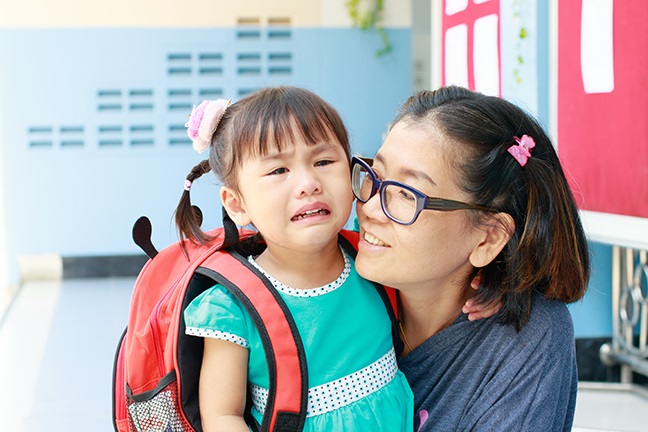By Andrea Fuentes and Candy Garcia
Parent Educators, Family Service Agency
Beginning kindergarten is a fun and exciting milestone in a child’s life, so why do we (parents and children) feel so anxious about it? And how can we alleviate some of this worry?
Before we can tackle the big goals of helping our children build self-esteem and find school success, we first need to make sure they are well-rested, well-fed, healthy, and safe.
Start by taking a few moments each day to think about your breathing, and model this to your child.
If we want to set our children up for success as they embark on this exciting new phase in their lives, let’s start with the basics— breathing. It is so fundamental that we easily forget how much of a role it plays in literally everything we do. Today, more and more schools are actively engaging students in practices of mindfulness, meditation, and deep-breathing. You can get tips for stress-reducing exercises on websites like Go Noodle. Get your preschoolers used to mindful breathing, as it will serve as the best coping mechanism they have as they enter the uncertainties of kindergarten.
A child beginning kindergarten can set off many nervous “firsts” for a young family. The first back-to-school shopping, which can be both exciting and expensive. The first school registration, including ensuring your child has all the proper immunizations. The start of kindergarten can also signal the first time our child will be away from the security of home and parents for an extended period. While separation anxiety is a normal part of child development, it can certainly feel scary when our child’s, or our own, emotional safety is compromised.
Build a trusting relationship with your child’s teacher.
One way to curb anxieties about school is to develop an open and trusting relationship with our child’s teachers. To build clear and safe lines of communication, parents, teachers, and other caregivers need to collaborate, especially when it comes to feelings of anxiety and apprehension about school.
Ask if your child’s teacher and school use modern communication tools, such as Parent Square and Class Dojo. These programs give parents an inside line to school-wide and classroom events. Knowing what is going on and what’s coming up will help everyone feel more secure.
Create and maintain manageable routines to support expectations for home and school.
You can also create reliable routines to help lower anxiety on both ends. For example:
- Have consistent mealtimes and bedtimes.
- Volunteer one morning or afternoon per week.
- Coordinate dependable drop-off and pick-up procedures.
- Write the teacher notes and have your child deliver them.
Creating predictable routines like these will help both you and your child feel more at ease about all of the changes that come with starting school.
Communicate candidly with your child,especially about emotions.
To help your child meet their needs of emotional safety, talk to your child often about their feelings throughout the school day. Focus first on helping your child understand and label their emotions, (Did you feel mad or jealous about what happened at recess? Why did you feel that way?). Then, guide your child on ways to regulate their feelings in a healthy way, (After taking some deep breaths, did you tell your friend how you were feeling?). Make sure to model this kind of metacognition throughout your day-to-day life. Our kids need to see that it is normal to talk about feelings, and the best way to do that is by modeling their parents’ behavior.
Starting school for the first time can provoke anxiety in children and parents, and that’s completely normal. As parents, we can ease our own anxiety, and that of our children, by practicing stress-reducing exercises and developing strong and clear lines of communications with teachers. Take time to reflect in the newness of this experience. Remember to talk to your children about their feelings and share your own with them.
About the authors: Candy Garcia and Andrea Fuentes teach parenting and healthy relationship classes at several school campus sites in the Santa Barbara area.


